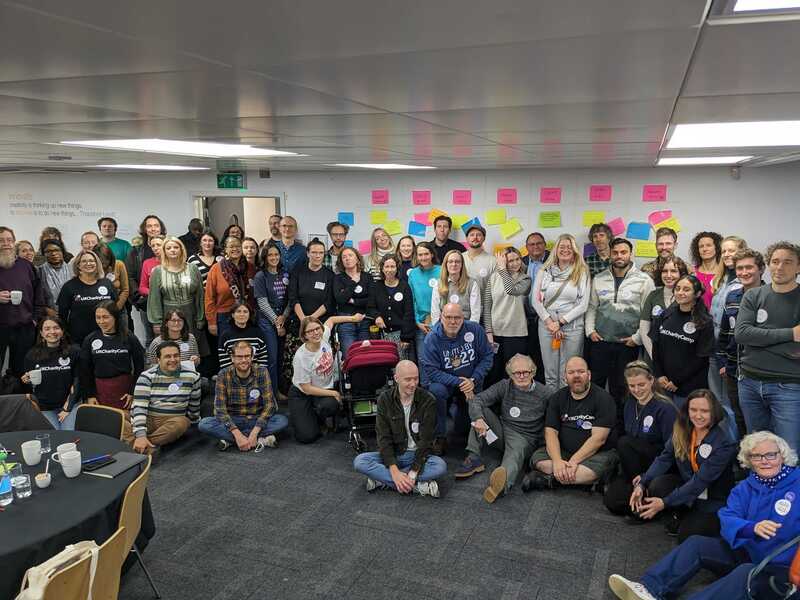Hopes and fears from UKCharityCamp

I’m optimistic about the future. There are so many great folk in the charity sector, and I believe we can collectively rise to the challenges
It’s a new year and time for a bit of a future gazing. As we prepare for UKCharityCamp 2025 on 13 November (save the date) it’s a good time to reflect on last year’s event. UKCharityCamp 2024 helped spark some brilliant conversations, and I’m looking forward to seeing where these lead. There’s a couple of specific areas on my mind where I have hopes and fears, though.
Generative AI everywhere
I hope that Generative AI will enable folk working in charities to do more with less, by saving time on tasks that can safely be delegated to AI. I fear that careless use will do one or more of 3 things. First, it’ll actually harm someone using an AI-augmented service by giving them inaccurate advice. Secondly, it’ll soak precious digital team time in duplicating experimentation that has already been done elsewhere. As the fabulous Rachel Coldicutt said last month – FOMO is not a strategy. Thirdly, it’ll soak funder time by increasing still further the numbers of applications they have to handle.
To mitigate that first risk, please have the right governance in place. When digital services took off in the 2010’s, you needed development skills to experiment. This time round, there’s commodity AI services that mean experimentation can happen far more rapidly. For that to happen safely, effective advice to your staff is a must. If you’ve chosen to develop a service yourself, follow the strategy CItizens Advice Oldham, Rochdale and Stockport took developing Caddy, their tool “to help customer service advisors and supervisors in quickly locating and sharing information”. Stuart Pearson, their head of innovation, says they decided to “code their own using Anthropic’s Claude model, rather than use a commercially available service such as ChatGPT, to only train it on trusted, chosen data, and to keep a human in the loop.” The code for their service is open on Github, and they encourage you to use it as the basis for your own advisory services. You’ll need Claude API access to start developing on it.
To reduce the impact of the second, please, please, share your experiments and check what others have done before. Dan Sutch from CAST wrote a useful framework for experimenting back in May, and we used it to test using ChatGPT with a known dataset. (Protip: it’s good at getting a first draft fast.) CAST helped us release that experiment as a Shared Digital Guide. They’ve a few guides on AI now, and the more the merrier.
I know people are working on my third worry. I’m glad the National Lottery Community Fund is focussing on the positives, that AI can help “support you if English is not your first language or if you’re new to writing funding applications.” and that using AI can help write applications “faster and with less effort.”. CAST have convened a funders’ group, “AI in grantmaking – peer group meeting” which has a wider remit. If anyone else is working in this area, please join up, or contact me if you need any discovery or development work. I’d love to help crack this one.
Digital inclusion: closing the divide
There is growing momentum around digital inclusion, as part of a broader consensus that diversity, equity and inclusion must be a key focus. I’m optimistic that this will help bridge the digital divide. Initiatives like the Digital Inclusion Toolkit that dxw sponsor, helps councils and others deliver digital inclusion programmes. This, Digital Unite’s help training digital champions, and the Good Things Foundation’s National Digital Inclusion Network are amongst many initiatives trying to help.
I fear that in times of immense budget pressure, these initiatives won’t get the funding they deserve and hard-pressed charities won’t have the capacity to help.
They need funding, and they need help, to make a difference. I think there might be some capacity in business CSR budgets and company volunteer days that could make a real difference. Corporate volunteering organisations such as Molly Bevan’s Impactic might have a role to play here.
Digital BAU
I hope that digital ways of working – as defined by Tom Loosemore back in the day as “Applying the culture, processes, business models and technologies of the internet-era to respond to people’s raised expectations.” – are now understood and employed by all UK charities.
I hope that charity leadership will trust their digital teams. I hope those teams are themselves led well. I hope those leaders have learned from early digital experiments, share their learnings and are part of good, resilient support networks.
My fear? Despite the progress made, digital ways of working are far from becoming truly embedded. There are so many competing themes for funders and leadership attention, each with excellent reasons for putting it first.
Those early experiments need funding if they’re delivering the outcomes people desperately need. They need killing if they aren’t. Systems built for larger budgets in pre-COVID times need simplifying. Where once charities built bespoke services, they need to take a hard look at how to use fewer lines of code to integrate products to do the same.
Looking ahead
I’m optimistic about the future. There are so many great folk in the charity sector, and I believe we can collectively rise to the challenges. UKCharityCamp 2025 will be an opportunity to come together once more to share insights, learn from each other, and build the support networks that will help us succeed.
Do get in touch if Neontribe can help with any of these fears.